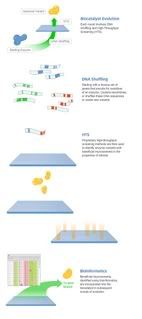Shell and Codexis expand collaboration to explore new 'super' enzymes for next-generation biofuels
 The development of sustainable biofuel took a step forward today as Royal Dutch Shell plc expanded its collaboration with Codexis Inc. to develop new 'super' enzymes to convert biomass to fuel.
The development of sustainable biofuel took a step forward today as Royal Dutch Shell plc expanded its collaboration with Codexis Inc. to develop new 'super' enzymes to convert biomass to fuel.The new agreement covers five years of research collaboration and includes Shell making an equity investment in Codexis - a biocatalyst, synthetic biology and green chemistry company, - and taking a seat on the company’s board. Research will focus on adapting enzymes to improve the conversion of a range of raw materials into high-performance fuels. It will assist Shell in developing the next generation of biofuels as it explores a number of non-food bio materials, new conversion processes and alternative fuel products.
Codexis scientists create super enzymes capable of outperforming naturally occurring varieties. The company has successfully applied this pioneering technology to improve manufacturing processes for leading pharmaceutical companies, including Pfizer and Merck. The company has worked with Shell on biofuels since November 2006 and positive early results, including achievement of milestones ahead of schedule, have led to this new agreement and the broader collaboration announced today.
Breaking down and converting alternative, non-food bio material into high quality fuels for transport is complex. Processing efficiently at scale, in terms of both cost and C02 production, is challenging. This exciting research work into new powerful enzymes for more efficient conversion and better biofuels is part of Shell accelerating its drive to make next-generation biofuels a commercial reality. - Dr Graeme Sweeney, Shell Executive Vice President Future Fuels and C02Codexis’ technology makes it possible to customize 'super' enzymes capable of selectively and efficiently performing a desired chemical process. This technology, referred to as 'DNA shuffling', is part of a directed evolution program to manipulate the DNA blueprint of an enzyme.
DNA shuffling is research technique that takes select genes or gene variants and then recombines or “shuffles” the DNA to create new hybrid genes (schematic, click to enlarge; an interactive overview here). The resulting gene library is then screened for novel biocatalysts that possess desired properties:
 energy :: sustainability :: biomass :: bioenergy :: biofuels :: enzymes :: genetics :: biocatalyst :: biotechnology ::
energy :: sustainability :: biomass :: bioenergy :: biofuels :: enzymes :: genetics :: biocatalyst :: biotechnology :: Starting with a diverse set of genes that encode for variations of the enzyme catalyst, Codexis recombines, or shuffles these DNA sequences to create new variants. Using sophisticated high-throughput screening methods, novel biocatalysts with desired improvements are selected and these improved variants can then be put through the process again until a highly efficient biocatalyst is created that meets or exceeds targeted performance characteristics.
Codexis’ proven biocatalytic technology provides a powerful discovery pathway for development of next generation biofuels from renewable resources. In the first year of our collaboration, we have demonstrated the ability to solve complex technical challenges critical to successful biofuels development and commercialization. We look forward to continuing our work with Shell to bring clean, renewable liquid transportation fuels to the marketplace. - Alan Shaw, Ph.D., Codexis President and Chief Executive OfficerCodexis Inc., is a leading developer of clean biocatalytic process technologies that can substantially reduce the cost of manufacturing across a broad range of industries. Codexis’ proprietary directed evolution technologies enable novel solutions for efficient, cost-effective and environmentally friendly processes for pharmaceutical, energy and industrial chemical applications. In 2006, the company was recognised by the U.S. EPA with a Presidential Green Chemistry Challenge Award.
Royal Dutch Shell plc is working to meet government mandates for biofuel and, with its experience, expertise and assets, has become the world’s largest distributor of biofuels. The company is working with biofuel manufacturers to secure cost-effective supply and press for social and environmental safeguards. A constraint on the potential of conventional biofuels is that they use food crops. Shell is a leader in the development of next generation biofuels, using non-food bio materials, alternative processes and high-performance fuels.
References:
Codexis: Shell And Codexis Expand Collaboration To Explore New Super Enzymes For Next-Generation Biofuels - November 6, 2007.
Shell: media kit covering the new partnership, with videos and pics - November 6, 2007.
Shell: Quick guide to biofuels [*.pdf].
Shell: Shell Biofuels [*.pdf].
 --------------
--------------
 A new Agency to manage Britain's commitment to biofuels was established today by Transport Secretary Ruth Kelly. The Renewable Fuels Agency will be responsible for the day to day running of the Renewable Transport Fuels Obligation, coming into force in April next year. By 2010, the Obligation will mean that 5% of all the fuels sold in the UK should come from biofuels, which could save 2.6m to 3m tonnes of carbon dioxide a year.
A new Agency to manage Britain's commitment to biofuels was established today by Transport Secretary Ruth Kelly. The Renewable Fuels Agency will be responsible for the day to day running of the Renewable Transport Fuels Obligation, coming into force in April next year. By 2010, the Obligation will mean that 5% of all the fuels sold in the UK should come from biofuels, which could save 2.6m to 3m tonnes of carbon dioxide a year.








0 Comments:
Post a Comment
Links to this post:
Create a Link
<< Home